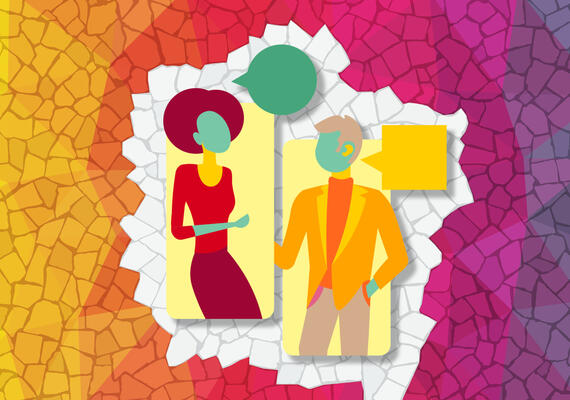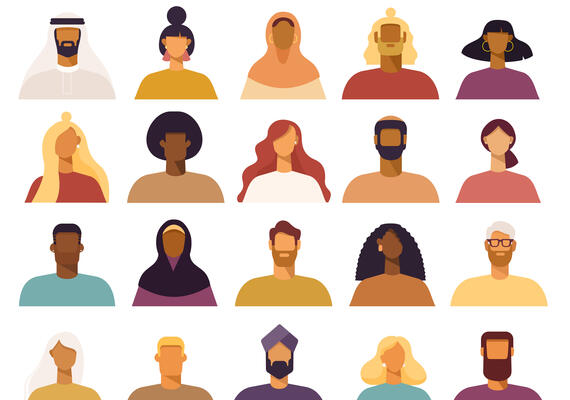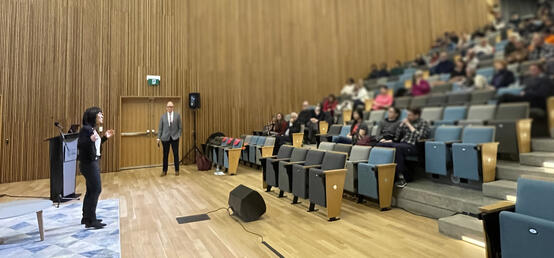Arts EDIA
Equity, Diversity, Inclusion and Accessibility in the Faculty of Arts

Our commitment
In all our research we are committed to being open, fair, impartial, and non-discriminatory.
We commit to creating opportunities and removing barriers for members of equity-deserving groups, including Indigenous Peoples, visible minorities, persons with disabilities, and individuals who are LGBTQ2S+.
Our strategic priorities are informed by our ethical commitment to the principles inscribed in ii’ taa’ poh’to’p, UCalgary’s Indigenous Strategy, the Scarborough National Charter on anti-Black Racism and Black Inclusion in Higher Education, as well as Dimensions: Equity, Diversity and Inclusion Charter, and the San Francisco Declaration on Research Assessment (DORA).
Our priorities
UCalgary Arts through its 2024-29 Strategic Plan focuses on strategic priorities that include:

Justice, Equity and Transformation
We seek to create, maintain, and sustain a more just and harmonious world. We contribute to social impact, innovations, and the welfare and dignity of individuals and communities.
Connection, Community and Culture
We embrace and nurture connections between individuals, communities and societies. We allow for different perspectives, promote tolerance, and foster cross-cultural understanding.
Equity, diversity, belonging and accessibility are among our guiding principles as a faculty.

EDIA workshops at UCalgary
Explore available workshops and training focusing on issues related to equity, diversity, inclusion and accessibility

Fellowship in Equity, Diversity, Inclusion and Accessibility
Awarded on an annual basis.
Deadline: September.
The objective of this fellowship is to further the Faculty of Arts’ strategic priority of advancing equity, diversity, inclusion, and accessibility on campus and in wider communities.
Where to find help
Resources for students
Knowing where to turn for assistance when your home community is experiencing a serious issue such as political upheaval, social unrest, or a natural disaster can be difficult. Get resources to help you deal with a social, political, or environmental crisis while you’re studying at UCalgary.
Decide if the situation is life-threatening or a critical incident.
- If you feel that the event poses a threat to your life or the life of another, immediately call 911.
Even if the event is not life-threatening, it could still be a critical incident.
- Note that everyone experiences the world in a different way. There is no single definition of a critical incident.
- But a critical incident is unexpected and unusual. You may experience it as a threat or trauma. An example of a critical incident related to racism is a threat of violence.
If you feel that this is a critical incident with safety concerns
- Call Campus Security: 403.220.5333.
- They'll help you identify and address immediate safety concerns.
If the situation is not life-threatening or a critical incident
You can, based on your comfort level:
- Call the ConfidenceLine. Reach them 24/7 toll-free at 1.800.661.9675. ConfidenceLine is an independent, third-party service that ensures student anonymity.
- Contact UCalgary’s Protected Disclosure Advisor. 403.220.4086 or disclose@ucalgary.ca.
- Report concerns to your department head or school director. Find their details on the contact page of your department or school website.
- Awards, scholarships and fellowships at UCalgary and beyond
- Search for undergraduate awards
- Explore external and government awards
Resources for faculty and staff
It's critical that you familiarize yourself with up-to-date requirements and procedures. Please review the following information in depth. Also seek more information if you need it: See UCalgary's policies and resources in this area.
If a student approaches you to report an act of discrimination or harassment
First determine if it is a life-threatening situation or a critical incident
- In the event of a life-threatening situation, immediately call 911.
Even if the event is not life-threatening, it could still be a critical incident.
- Note that everyone experiences the world in a different way. There is no single definition of a critical incident.
- But a critical incident is unexpected and unusual. The student may experience it as a threat or trauma. An example of a critical incident related to racism is a threat of violence.
If you determine that the situation is a critical incident with safety concerns
- Campus Security: 403.220.5333.
- They'll assist with identifying and addressing immediate safety concerns.
- Then, direct the student to the list of resources available at the University of Calgary. They can, based on their comfort level:
- Call the ConfidenceLine. 24/7 toll-free at 1.800.661.9675. ConfidenceLine is an independent, third-party service that ensures student anonymity.
- Contact UCalgary’s Protected Disclosure Advisor. 403.220.4086 or disclose@ucalgary.ca.
- Report concerns to their department head or school director. Find their details on the contact page of the department or school website.
Be proactive
It's important that we respond appropriately to reports of discrimination. Faculty and staff can also be proactive by foregrounding anti-discrimination issues. This includes ensuring that students know about available resources.
A Protected Disclosure is an allegation, by a member of the university community, of a breach by faculty or staff of a university policy.
The Canadian Association of University Teachers' Equity and Diversity Council is a standing committee that advises the CAUT Council. It has four working groups: Academic Staff with Disabilities Working Group, Lesbian, Gay, Bi-Sexual, Transgendered, Queer and 2-Spirited Academic Staff Working Group, Racialized Academic Staff Working Group and Women Academic Staff Working Group. View the issues and campaigns within CAUP, including equity-related issues.
“It is the role of the Faculty Association ... to ensure individual faculty members have equal access to justice, and that proper policies and procedures are in place to ensure that this goal is achieved. A ‘fair environment’ that discourages favouritism and protects faculty members from arbitrary decisions is the essential foundation of an intellectually independent and open university.” The Faculty Association website provides a general overview of faculty employment at the University of Calgary and also includes hiring issues of Sessional Lecturers.
The AUPE local 52 is the union that represents staff at the University of Calgary. The mission statement can be found on their website. Fair and equitable treatment of everyone is expected. The Statement of Principles of Conduct includes 7 points that include items pertinent to equity. These principles apply to the University community, not just staff or AUPE members. The AUPE center is located in Science A, Rm 128.
Explore available awards, scholarships and fellowships in equity, diversity, inclusion and accessibility at the University of Calgary and beyond.
Recognizing human rights, equity, diversity, inclusion and accessibility: Explore the Days of Significance calendar
Featured news
Durga Kale receives 2024 University of Calgary Teaching Award
UCalgary CLARE PhD lauded for her work as a sessional instructor
Take Action in the Spirit of Sisterhood
Join us as four industry leaders discuss the critical role art and the legal system play in advancing human rights.
The Final Rumble: Creative Arts Community Sparks New Movement
After 12 years, UCalgary Alumni Rich and Jessica Théroux are closing the curtain on Rumble House and sketching the blueprint for Calgary's next big art revolution.
CIH Applied Ethics Fellow Agnes Tam gains momentum towards a new ethics of belonging
Dr. Tam ranked first in the most recent SSHRC Insight Development Grant competition and was invited to contribute to Esker Foundation's "Permanent Collection".

Where We Gather, the Land Speaks
Experience the work of emerging Indigenous artists who use beadwork, quills, sound and installation to reflect on how the Land shapes identity, culture and belonging across Treaty 7.
Until Aug. 22
Nickle Galleries, Taylor Family Digital Library




